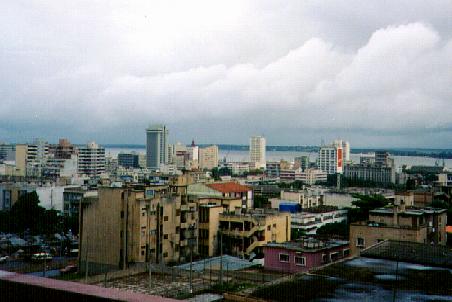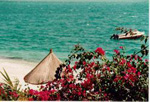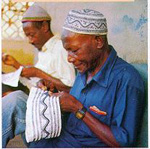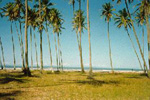|
Maputo:
|
Maputo is the former capital of Mozambique. Till 1976, it was known as Lourenco Marques, and was Mozambique's capital
and an important port city. Maputo, at one time was well-known for its beauty with its lovely beaches attracting tourists.
However, Mozambique became independent in 1975, and strained relations with South Africa meant that tourism suffered.
Even Maputo's status as an important port city suffered. However, in recent times, the situation in Maputo and
Mozambique have been improving. The city, with a population of over a million, is said to be "regaining some of
its old charm." The city also harbors many local industries including brewing, ship building, fish canning, iron
works, and manufacturing industries like cement and textiles. The city's railway station, recently renovated, was
originally built by a certain Monsieur Eiffel around the turn of the century. It is a must for tourists. There is
also a museum and a university in the Maputo.
|
|

Maputo
©2001: Bernard Cloutier
|

Beira
©2002: Tourist Office
|
|
Economy:
At independence, Mozambique inherited an agriculture-based economy with very little industrial development. The civil war
disrupted the economy and destroyed vital facilities, including much of the transport system. Agricultural products once
represented approximately 80 percent of Mozambique’s exports, and cashew nuts are still a large component of the total
today. Shrimp is also a major export product. But export diversity is projected to increase rapidly in coming years, as
the recently built Mozal aluminum smelter enters production, new or restored electrical transmission lines to South
Africa and Zimbabwe permit the giant Cahora Bassa hydropower plant to export electricity, and the discovery of natural
gas presents further opportunities for the exportation of energy or energy-intensive products. In 1987, Mozambique
embarked on a comprehensive economic reform program. Markets now determine the exchange rate, interest rates, and prices;
quantitative restrictions on imports and subsidies have been eliminated; import tariffs have been reduced and simplified;
and crop marketing has been liberalized. In addition, Mozambique’s privatization program is one of the most active in
Africa. More than 900 state enterprises have been restructured or privatized, including the entire banking sector and
a number of state manufacturing firms. As a result of these measures, inflation was reduced from 70 percent in 1994 to
2 percent in 1999 and the country has been able to attract substantial external investment. The annual inflation rate
of 14.7 percent in July 2000 indicates that vigilance must be maintained, though some of the jump upwards has resulted
from flood-related shortages. Economic growth has also been impressive, exceeding 10 percent on average in the past few
years. In light of the flood emergency, the Government recently estimated that GDP growth will fall to 3.8 percent in
2000 (from pre-flood projections of about 10 percent). A modest recovery is expected in 2001 as a result of late-starting
reconstruction and the entry of the Mozal smelter into production.

Praia de Zavala
©2002: Tourist Office
|

©2002: Tourist Office
|

©2002: Tourist Office
|
|
|
Mozambique has the economic potential to become one of the brighter spots in Africa. The country is endowed with vast
and untapped natural resources which can support the development of agriculture, forestry and fishing, energy, and
tourism. It is situated in an ideal trading location for products moving to and from the interior of South Africa
(its largest trading partner), Malawi, Swaziland, Zimbabwe, and Zambia. To capitalize on these advantages, Mozambique
is developing its transportation corridors. The Government also recently completed an interim Poverty Reduction Strategy
Paper (PRSP), which incorporates its Action Plan for the Reduction of Absolute Poverty, and it is expected to complete a
full PRSP by April 2001. In February and March 2000, the country suffered from devastating rains and floods, which have
further compounded the daunting economic challenges that it faces. In total, 700 people died; 491,000 were displaced;
20,000 cattle were lost; 140,000 hectares were inundated; and 52 health facilities (four hospitals) and 500 primary
schools were significantly damaged. There was also extensive damage to property, roads, railways, and key utilities
in the affected areas. Bank staff estimate the direct costs of the flood emergency at US$273 million (almost evenly
divided between the public and the private sectors), with the cost of reconstruction to improved (more flood-resistant)
standards at about US$430 million.
|
July 2001:
The Development Bank of Southern Africa (DBSA) agreed to extend a 320 million rand (40 million dollars) loan to expand
the Mozal aluminium smelter in Mozambique. The completion of the second stage of the smelter will double its output to
506,000 tonnes of aluminium per year, and will cost one billion dollars, the bank said in a statement. Mozal, which is
situated outside the Mozambican capital of Maputo, accounts for about two percent of world aluminium output. DBSA chief
executive and managing director Mandla Gantsho said the bank had made the loan in a bid to "support economic development
in the (14-nation) Southern African Development Community." The main sponsor for the project is Billiton-BHP, one of the
world's largest aluminium producers. Mozal's expansion is expected to boost Mozambique's foreign exchange earnings by
100 million dollars and its gross domestic product by seven percent.
History:
Mozambique was inhabited by various Bantu tribes during the 14th and 18th century, who became involved with Swahili
and Arab traders on the eastern coast in slave trade. The Portugese were the first Europeans who arrived at Mozambique
to colonize. While the city of Maputo gets its name from a Portugese trader who explored the area in 1544, the town
formed itself around the Portugese fortress that was established here in 1787. From there on, it grew until it became
the capital of Portugese East Africa in 1907. Mozambique gained independence from Portugal in 1975, after a struggle
spearheaded by the Front for the Liberation of Mozambique (FRELIMO). Mr. Samora Machel became the first president.
Almost immediately the country was plunged into civil war, with FRELIMO fighting against the Mozambique National
Resistance, also known by its Portuguese acronym, RENAMO. In 1992, a General Peace Agreement was signed, and in 1994
and again in December 1999 Mozambique held multiparty presidential and legislative elections, which were won by
Mr. Joaquim Chissano and his FRELIMO party.
Enabling us to improve the quality of the content, if you have additonal information, remarks or suggestions,
please share it with us by e-mail.
MAPUTO, 28 Sep 28 2001: Hundreds of thousands of people in central Mozambique, devastated by floods, face a
serious threat of starvation and the situation is expected to worsen in coming months. "In a recent tour of that region
we identified pockets of hunger involving about 350,000 people," National Disaster Management Institute (INGC)
director Silvano Langa told journalists. Langa warned that the situation would worsen within the next two months
if measures are not taken urgently. The impoverished nation is still struggling to recover from catastrophic floods
of last year and early this year, during which more than 800 people died.
MAPUTO, July 10 2001: Mozambique plans to build a major dam in the southern Maputo province to control flood
waters. The dam in Moamba district, in Maputo province, 70 kilometres (40 miles) west of Maputo, is expected to cost
360 million US dollars, the ministry of public works and housing said in a statement late Monday. The African
Development Bank will fund the project. In 2000, the southern provinces of Maputo and Gaza were hit by the worst
floods in Mozambican history.
Last update: April 20, 2008
|